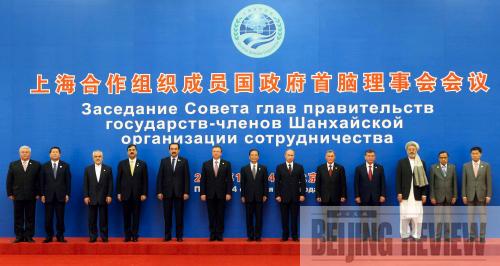|
 |
| BOOSTING COOPERATION: The eighth prime ministers' meeting of the Shanghai Cooperation Organization member states opens on October 14 in Beijing (LIU WEIBING) |
The Shanghai Cooperation Organiza-tion (SCO) was originally founded strictly as a regional security organization, and has followed this path with discipline in recent years. But with the shifting tides of the global economy, SCO member states have expanded their pursuits to include areas such as trade and the economy, as well as increasing cooperation in the financial, social and cultural arenas.
During the eighth SCO prime ministers' meeting held in Beijing on October 14, hosted by Chinese Premier Wen Jiabao, SCO representatives spoke of great progress.
In particular, leaders of member states lauded the strong degree of economic and social cooperation thus far during the past year, while adding that more needs to be done.
Against the background of the slow recovery of the world economy, this year's summit revolved around cementing economic ties in the spirit of continued progress.
Still, compared with past discussions on the economy, SCO prime ministers spent more time addressing sustainable development for the whole region. To this end, participants were especially mindful of the current financial crisis.
According to a joint statement released after the meeting, the SCO will continue to advocate exchanges and cooperation in broader fields. Besides trade and the economy, those fields shall include energy, natural resources, agriculture, telecommunications, transportation, quality guarantee, customs, and culture, as well as environmental protection.
In all, the SCO prime ministers' meeting made outstanding achievements in four principal aspects:
- Mapping out measures to enhance economic cooperation to cope with the global financial crisis and ensure sustainable development. SCO representatives agreed on establishing an SCO economic development surveillance mechanism at the meeting.
- Strengthening cooperation and dialogue on financial issues. The SCO decided to step up efforts to establish a special joint account to address financial issues for large projects as they arise. SCO members will also discuss holding meetings of their finance ministers and central bank governors.
- Pursuing measures to facilitate trade. These measures may include perfecting infrastructure building in the member states' ports of entry, enhancing customs clearance capacity, supporting coordination on solving problems concerning product quality safety in regional trade, and promoting commodity circulation in the region.
- Deepening cooperation on agriculture, science and technology. The organization also plans to formulate and implement programs to enhance its members' ability to cope with global challenges. An SCO information superhighway is expected to be implemented in the very near future, too.
Although the global financial crisis is slowing, its onerous influence carries on. Consequently, trade between SCO member states has decreased. For example, the trade volume between China and Russia—the biggest trade partners inside the region—had dropped some 40 percent in the first half of 2009. Thus, SCO states demonstrated stronger aspirations when it came to enhancing multilateral trade and economic cooperation in wider cooperative aspects.
"Facing common challenges like this, if a cooperative mechanism cannot find a proper solution, its influence and coherence will be greatly damaged," said Chen Yurong, Director for SCO Studies at the China Institute of International Studies.
Pushing forward trade and investment convenience is the short and mid-term task of the organization, she said. Chen, however, pointed out that the task at hand would be hard to fulfill if the organization could not solve the problem of immediate capital shortages.
Establishing a special SCO account will be a good way to settle down the issue and enable investment in large-scale projects. Such an account would likely turn into a development fund based on the SCO's inter-bank union.
Pan Guang, an expert on SCO studies from the Shanghai Academy of Social Sciences, stressed that establishing an economic development surveillance mechanism would standardize trade and economic cooperation within the organization.
This move, moreover, represented the SCO's cooperative direction of strengthening monitoring regional financial systems, in accordance with international trends.
Established in Shanghai in June 2001, the SCO is the first international organization set up in China and named after a Chinese city. It groups China, Russia, Kazakhstan, Kyrgyzstan, Tajikistan and Uzbekistan, with Mongolia, Pakistan, India and Iran as observer states. Over the SCO's eight-year history, China has made persistent efforts to foster the organization's growth and progress. At this year's prime ministers' meeting, Chinese Premier Wen Jiabao stressed China's ongoing commitment to the SCO.
At the summit, he also announced Beijing's intentions to fully implement the $10 billion loan package it previously promised to other SCO members. China, he pledged, would continue sending trade and investment delegations to other SCO member states, while opposing trade and investment protectionism.
China also agreed to offer capital support to help SCO members to participate in the Shanghai World Expo in 2010, in order to increase cultural and social exchanges in the region.
Besides trade and economic cooperation, SCO prime ministers stressed the organization's function of maintaining regional peace and security, vowing to strengthen cooperation against terrorism, separatism and extremism.
Two days after the prime ministers' meeting, the 15th meeting of the Council of the SCO's Regional Antiterrorism Structure took place in Tashkent, Uzbekistan. The meeting revolved around exchanges of intelligence between China and other SCO members regarding terrorism, separatism and extremism. At the meeting, SCO members decided to jointly take measures to guarantee the security of the Shanghai World Expo, the 2010 Guangzhou Asian Games and the 2011 Asian Winter Games in Almaty, Kazakhstan. | 